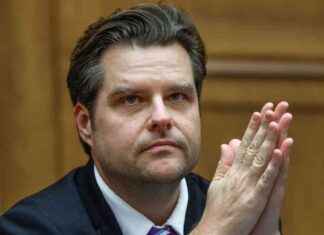Pope Francis has acknowledged that the drama of residential schools for natives in Canada amounts to a “genocide”, after returning from a six-day trip at the end of which he admitted that he would have to spare himself or withdraw.
• To read also: The pope, diminished, admits that he will no longer be able to “travel at the same pace”
• Read also: The pope in Canada: unimaginable suffering
• Read also: Pope’s visit: Indigenous survivors have been heard
During this “penitential pilgrimage” which led the sovereign pontiff from western Canada, to Quebec and then to the Far North, he repeatedly asked forgiveness from Canadian Amerindians for this system in which at least 6,000 children perished between the end of the 19th century and the 1990s.
“I didn’t say the word (during the trip) because it didn’t come to mind, but I described the genocide. And I apologized, asked forgiveness for this process which is a genocide”, declared the pope during a press conference on the plane bringing him back to Rome on the night of Friday to Saturday.
“Abduct children, change culture, change mentality, change traditions, change a race, let’s put it like that, a whole culture,” added the Argentine sovereign pontiff in reference to boarding schools for indigenous children (First Nations, Métis and Inuit).
Some 150,000 children were forcibly enrolled in these boarding schools. Many suffered physical or sexual abuse, and thousands never recovered, victims of disease, malnutrition or neglect.
“Open” door
Diminished by severe knee pain forcing him to move around in a wheelchair, the 85-year-old pope also confided that he could no longer “travel” at the same pace as before, also mentioning the possibility of “putting himself aside “.
“I don’t think I can maintain the same pace of travel as before. I believe that at my age, and with these limits, I must spare myself in order to be able to serve the Church, or on the contrary think about the possibility of putting myself aside”, like the historic renunciation of Benedict XVI in 2013.
“In all honesty, it’s not a disaster. We can change popes. This is not a problem. But I believe that I have to limit myself a little, with these efforts”, added the pope, who again repeated that the door remained “open” for a possible renunciation.
“But until today I haven’t pushed that door,” he explained, saying he wanted to continue traveling.
strong emotion
For the last stopover of his trip, in Iqaluit, capital of Nunavut in the Canadian Far North, the pope was welcomed to the sound of Inuit throat singing, in the middle of colorful houses.
In this small town accessible only by plane and where just over 7,000 people live, mainly indigenous people, the Pope once again spoke of the “great sufferings” of those forcibly placed in boarding schools aimed at “killing the Indian in the child’s heart.
“Families have been disintegrated, children taken away from their environment; winter has descended on everything,” he lamented in front of the crowd gathered between the school and the basketball court a few meters from the cliffs and the sea. Many of them were holding hands or hugging each other. embrace while listening to him speak.
In this part of the world which heats up three times faster than the rest of the planet, the Argentinian Jesuit, forced to move around in a wheelchair due to knee pain, also called for “taking care” of the Earth which “ is as delicate as each person and people”.
‘Apologies not complete’
Throughout the trip, natives spoke of a “release of emotion” upon hearing the words of the spiritual leader of the 1.3 billion Catholics.
But as at each of his stages of travel, some survivors or their descendants have come to remind them that they expect more.
Some have called for the return of indigenous art objects kept in the Vatican for decades and the opening of the archives of the boarding schools.
But they also called on Francis to repeal papal decrees that gave rise to the “doctrine of discovery”. This refers to the 15th century papal edicts that authorized European powers to colonize non-Christian lands and peoples.
Asked about this on the plane, François judged this “doctrine of colonization” “bad” and “unfair”.
“This mentality that we are superior and the natives don’t matter is serious. For this, we must work in this direction. Go back and clean up all that has been badly done, but being aware that today too, there is the same colonialism, ”he replied.
For some like Kilikvak Kabloona, president of the Nunavut Tunngavik organization which represents the Inuit of Nunavut, “the pope’s apology was not complete”, because he did not directly mention the “sexual abuse” suffered by the natives.







